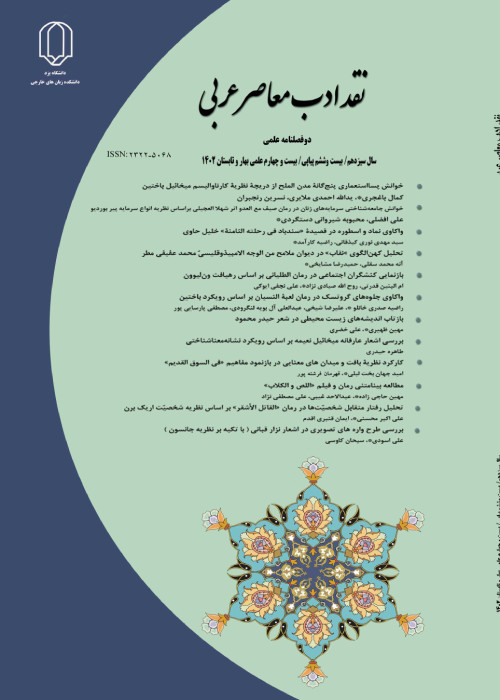A Semantic study of the mystical poems of Mikhail Nu'ayma
The present study analyzes the mystical poems of Mikhail Nu'ayma. Influenced by familiarity with the philosophical ideas and mysticism of India, Buddhism, Greek, Platonism, and, most importantly, Islamic mysticism, he was able to create valuable works in this field. The most prominent mystical ideas such as the unity of existence, deep connection with nature, mystical death thinking, a manifestation of God's essence in existence, love, etc. are among his poetic themes. In the analysis of the mentioned poems, a new semiotic-semantic approach is considered, which started from Saussure's semiotics and entered the field of narration by GRIMES. Semiotics is a science that studies the signs in a special system and in addition to language can be used in all dimensions and levels of human life. The semantic semantics of discourse is a new method in literary criticism that has received less attention in Arabic literature than other critiques. Semantics is of particular importance in the study and analysis of texts as well as in how meaning is produced and received. This perspective interacts with semiotics, linguistics, discourse analysis, phenomenology, anthropology, cultural studies, and semantics.Selected poems by Mikhail Nu'ayma, with their mystical theme and having the nature of Shushi, action mechanisms, tense space, and many literary potentials, can be studied with a sign-semantic approach. Semantic-semantic analysis of these poems, while explaining discourse processes such as sensory-perceptual, cognitive, emotional, and aesthetic processes, shows what factors have influenced the poet's mind in the process of meaning expression and how discourse has been found its semantic side.The semiotic study of the mystical poems Mikha'il Nu'ayma is done according to several dimensions of discourse, which are:1- Theoretical foundations of discourse, ie language, always faces gaps that the finder fills with his interactive activity. What we read and hear is only one side of the coin, and it is the finder who finds the coin on the other side and participates in the actions of completing the discourse.2- Cognitive dimension of discourse No linguistic production can claim to create or present complete cognition. Cognition occurs when we become aware of something. Cognition has a subject that is in the communication cycle and is transferred from one factor to another. A poem introduces two cognitive types as follows:1- Technical cognition: cognition that has a logical path and has an argumentative aspect and can be called action cognition.2- Mythological recognition: which determines the conditions of our presence or our species in front of a subject. This type of cognition can be called Shushi. It is in this kind of cognition that we get excited, surprised, or impressed. The cognition of a myth is believable rather than knowledge-creating.3- Sensory-perceptual dimension of discourseSensory-perceptual activity is an activity that is rooted in the sensory-perceptual flow and owes its existence to it. The stronger the feeling and perception, the more transformative and dynamic the discourse activity. Because the real meaning is hidden from view during the escape from reality, the non-emotional relationship between the signifier and the signified can not be responsible for semantic productions alone, and the only way to reach meaning is to achieve the sensory-perceptual foundations of the sign of meaning.4- The emotional dimension of discourse in the sense that what regulates the emotional process of discourse is a tense atmosphere. The tense atmosphere engages with the poet's emotion and lays the foundation for the creation of value. Emotions are like perfumes that are spread throughout the speech and affect the atmosphere of discourse with its mild or pungent odor. The more stressful the space, the deeper the emotion, and conversely, the more superficial the tension, the less emotion there is, and the discourse moves toward mechanization. The emotional dimension examines the conditions for the formation and production of the emotional system and how meaning is created through it. In general, the emotional world is a world that is opposed to narrative logic. A world that is no longer based on action but on Susa, in which the first letter is played.Elements such as effective verbs are involved in the emotional process of discourse. Effective verbs are verbs that do not directly have an active role but affect action verbs. These verbs are: to want, to stand, to know, to be able to, to believe.5- The aesthetic dimension of discourseThe beauty of discourse is partly influenced by its discontinuity. If the discourse follows a natural and unobtrusive routine, its beauty is damaged and it becomes a mechanical discourse. There are many linguistic features such as selection, separation, differentiation, etc. that cause prominence and discontinuity.An examination of a selection of poems by Mikhail Nu'ayma, in the form of a semantic-semantic model, shows how meaning is expressed in sensory-perceptual, emotional, and aesthetic processes.The poet shows his emotions by composing poems that refer to the unity of existence, death, an optimistic view of existence, and so on.
mysticism , Arabic poetry , Mikha' , il Nu' , ayma , sign-semantics
- حق عضویت دریافتی صرف حمایت از نشریات عضو و نگهداری، تکمیل و توسعه مگیران میشود.
- پرداخت حق اشتراک و دانلود مقالات اجازه بازنشر آن در سایر رسانههای چاپی و دیجیتال را به کاربر نمیدهد.



